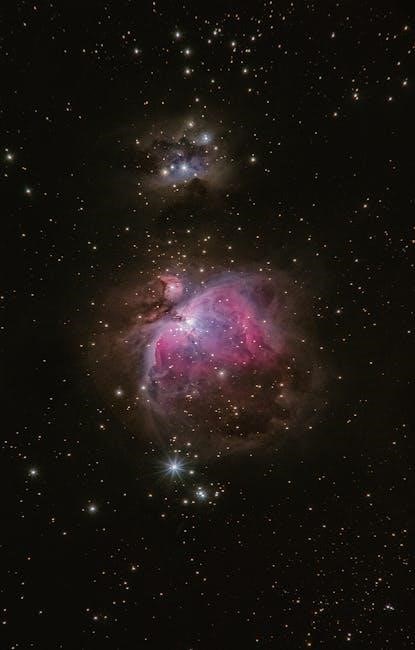The Universe Next Door by James W. Sire is a seminal work exploring worldviews‚ offering a clear‚ concise introduction to diverse philosophical perspectives. Its fifth edition‚ available as a PDF‚ remains influential in understanding theism‚ naturalism‚ Marxism‚ and more‚ providing a foundational framework for comparative analysis.

1.1. Author Background
James W. Sire‚ author of The Universe Next Door‚ is a renowned Christian author and speaker with a Ph.D. from the University of Missouri. His work focuses on worldview analysis‚ equipping readers to understand and evaluate diverse philosophical perspectives. Sire’s academic background and teaching experience have shaped his ability to present complex ideas in an accessible manner. As a prominent voice in Christian apologetics‚ he emphasizes the importance of recognizing and critically assessing worldviews. His writings‚ including The Universe Next Door‚ have become foundational resources for students and scholars alike‚ offering insights into theism‚ naturalism‚ Marxism‚ and other influential ideologies. Sire’s contributions have significantly impacted both academic and cultural discussions‚ making him a trusted authority in the field of worldview studies.
1.2. Book Overview
The Universe Next Door by James W. Sire is a comprehensive guide to understanding worldviews‚ offering a clear and accessible introduction to various philosophical perspectives. First published in 1976‚ the book has undergone several editions‚ with the fifth edition being the most recent‚ available as a PDF. It explores major worldviews such as theism‚ deism‚ naturalism‚ Marxism‚ nihilism‚ existentialism‚ Eastern monism‚ New Age philosophy‚ and postmodernism. Sire uses his influential model of eight basic worldview questions to examine these perspectives‚ providing a structured framework for comparative analysis. The book is widely regarded as a foundational resource for students‚ scholars‚ and general readers seeking to navigate the complexities of diverse belief systems. Its concise yet thorough approach has made it a standard text for understanding the intellectual and cultural landscapes shaped by these worldviews.
1.3. Significance of the Book
The Universe Next Door holds profound significance as a foundational text in worldview studies. Its clear‚ readable style and structured approach have made it a cornerstone for understanding diverse philosophical perspectives; The book’s ability to engage both academic and general audiences has contributed to its enduring relevance. By comparing worldviews such as theism‚ naturalism‚ and postmodernism‚ Sire equips readers with critical thinking tools to evaluate their own beliefs and those of others. Its influence spans over four decades‚ with the PDF version ensuring accessibility for modern readers. The book’s significance lies in its role as a bridge between intellectual inquiry and practical application‚ fostering a deeper understanding of the ideas shaping our world. Its timeless insights continue to resonate‚ making it an indispensable resource in today’s multicultural and intellectually diverse landscape.

Understanding Worldviews
Worldviews are comprehensive frameworks shaping perceptions of reality‚ addressing questions about the universe‚ humanity‚ knowledge‚ and ethics. They influence beliefs‚ values‚ and understanding of life’s purpose‚ as explored in depth in The Universe Next Door.
2.1. Definition and Importance
A worldview is a fundamental orientation of the heart and mind that shapes how individuals and cultures perceive reality. It answers life’s biggest questions: What is the nature of the universe? Who are we? What is right and wrong? Worldviews are crucial because they influence beliefs‚ values‚ and decisions‚ serving as a framework for understanding existence. In The Universe Next Door‚ James Sire emphasizes that worldviews are not just intellectual constructs but deeply personal‚ guiding how we live and interact with the world. Recognizing and understanding different worldviews is essential for meaningful dialogue and critical thinking in a diverse‚ globalized society. Sire’s framework helps readers identify and evaluate their own worldview‚ encouraging a deeper awareness of the beliefs that shape their lives and interactions with others.
2.2. Historical Context
The concept of worldviews has evolved significantly over time‚ shaped by key historical events‚ philosophical movements‚ and cultural shifts. Ancient civilizations developed mythological and religious frameworks to explain the universe‚ while the Enlightenment era introduced rationalism and scientific inquiry. The rise of modernism in the 18th and 19th centuries emphasizing reason and progress contrasted with postmodernism’s skepticism of grand narratives. In The Universe Next Door‚ James Sire traces the development of major worldviews‚ such as theism‚ naturalism‚ and Marxism‚ highlighting their origins and evolution. Understanding this historical context is crucial for grasping how contemporary worldviews like postmodernism and New Age philosophy emerged as responses to earlier intellectual and cultural traditions. Sire’s analysis provides a rich backdrop for evaluating the diversity of thought that shapes human understanding today.
2.3. Role in Shaping Beliefs
A worldview serves as a mental framework that shapes an individual’s beliefs‚ values‚ and understanding of reality. It influences how people perceive the world‚ interpret experiences‚ and make decisions. A person’s worldview is not just an intellectual construct but also an emotional and psychological orientation that colors their perspective on life. In The Universe Next Door‚ James Sire emphasizes that worldviews are foundational‚ determining how individuals view purpose‚ morality‚ and human nature. They also shape cultural and societal norms‚ as collective worldviews influence art‚ science‚ and philosophy. By identifying and understanding one’s own worldview‚ as well as those of others‚ individuals can better navigate the complexities of belief systems and their implications. Sire’s analysis highlights the critical role worldviews play in forming identities and guiding actions‚ making them indispensable for meaningful engagement with the world.

Major Worldviews Explored
The Universe Next Door examines key worldviews such as theism‚ deism‚ naturalism‚ Marxism‚ nihilism‚ existentialism‚ Eastern monism‚ New Age philosophy‚ and postmodernism‚ offering insights into their core beliefs and implications.
3.1. Theism

Theism‚ as explored in The Universe Next Door‚ refers to the belief in a personal‚ transcendent God who created the universe and remains actively involved in it. This worldview is central to religions like Christianity‚ Judaism‚ and Islam. Theistic perspectives emphasize a divine being who is both omnipotent and morally good‚ providing a foundation for understanding humanity’s purpose and the nature of reality. In contrast to deism‚ which posits a distant‚ uninvolved deity‚ theism underscores God’s direct engagement with the world and human lives. The book highlights how theistic beliefs shape ethical frameworks‚ views of human nature‚ and the concept of divine revelation. By examining theism alongside other worldviews‚ Sire helps readers critically evaluate its claims and significance in shaping cultural and personal beliefs. This section provides a clear‚ concise overview of theism’s core tenets and its role in the broader spectrum of worldviews.
3.2. Deism
Deism‚ as discussed in The Universe Next Door‚ is a worldview that posits the existence of a supreme being who created the universe but does not intervene in its affairs. Unlike theism‚ which emphasizes a personal‚ actively involved God‚ deism views God as distant and uninterested in human life. This perspective often aligns with Enlightenment-era rationalism‚ emphasizing reason over revelation. Deists typically reject supernatural elements and miracles‚ advocating for a universe governed solely by natural laws. Sire highlights how deism influenced modern secular thought‚ particularly in its emphasis on human autonomy and self-reliance. By contrasting deism with theism‚ the book provides insight into the philosophical underpinnings of this worldview and its implications for understanding morality‚ human purpose‚ and the nature of reality. This section offers a clear analysis of deism’s core beliefs and its historical significance.
3.3. Naturalism
Naturalism‚ as explored in The Universe Next Door‚ is a worldview that asserts the physical universe is the only reality‚ governed by natural laws and principles. It rejects the supernatural‚ emphasizing that all phenomena can be explained through science and reason. Naturalism often underpins scientific inquiry‚ advocating for empirical evidence as the sole basis for understanding existence. This perspective shapes views on morality‚ consciousness‚ and human purpose‚ suggesting they arise from natural processes rather than divine intent. Sire examines how naturalism influences modern thought‚ particularly in its exclusion of spiritual dimensions. By contrasting naturalism with theistic beliefs‚ the book highlights its implications for debates on human meaning and the nature of reality. This section provides a clear overview of naturalism’s core tenets and its role in shaping contemporary ideologies.
Marxism‚ as discussed in The Universe Next Door‚ is a worldview rooted in the ideas of Karl Marx‚ emphasizing materialism and class struggle. It posits that economic systems and social structures drive historical progress and human relations. Marxism views religion and philosophy as reflections of economic conditions‚ advocating for a classless society achieved through revolutionary change. Sire highlights how Marxism critiques capitalism and seeks to eliminate exploitation‚ but also notes its rejection of spiritual dimensions and its reliance on dialectical materialism. The book explores Marxism’s influence on modern thought‚ particularly in its focus on societal transformation and human liberation. By analyzing its strengths and weaknesses‚ Sire provides a balanced perspective on Marxism’s role in shaping political and social ideologies. This section offers a concise yet comprehensive overview of Marxist thought and its implications. Nihilism‚ as explored in The Universe Next Door‚ is a worldview that rejects the existence of inherent meaning‚ purpose‚ or value in life. It asserts that traditional beliefs‚ moral frameworks‚ and truths are baseless‚ leading to a rejection of objective standards. Nihilists argue that life is inherently meaningless‚ and any sense of purpose is a human construct. This perspective often results in moral relativism‚ where actions are not judged by universal principles but by individual or cultural preferences. Sire examines how nihilism challenges the notion of objective truth and its implications for ethics and society. He also discusses the cultural and philosophical roots of nihilism‚ linking it to modern existential crises and the search for meaning in a seemingly indifferent world. By critiquing nihilism‚ Sire provides insights into its influence on contemporary thought and its limitations in addressing human existential questions. Existentialism‚ as discussed in The Universe Next Door‚ emphasizes individual freedom and responsibility‚ asserting that individuals create their own meaning in life. This worldview‚ rooted in philosophers like Søren Kierkegaard and Jean-Paul Sartre‚ posits that human existence precedes essence‚ meaning individuals are not defined by inherent qualities but by their choices. Existentialists reject external determinism‚ arguing that individuals must accept the freedom to choose their path in life. Sire explores how existentialism contrasts with worldviews like theism and naturalism‚ highlighting its focus on personal authenticity and the inherent ambiguity of life. He also critiques existentialism for its subjectivism‚ arguing that it can lead to a fragmented understanding of reality. By examining existentialism‚ Sire provides insights into its influence on modern thought and its implications for understanding human existence and purpose. Eastern Monism‚ as explored in The Universe Next Door‚ posits that the universe is a unified‚ interconnected whole‚ with all distinctions being illusions. Rooted in Eastern religions like Hinduism and Buddhism‚ this worldview asserts that the divine is an impersonal‚ all-encompassing reality. Monists believe that the ultimate goal is to realize one’s unity with this ultimate reality‚ often through meditation or self-realization. Sire highlights how Eastern Monism contrasts with Western dualistic worldviews by rejecting the idea of a personal God and emphasizing the illusory nature of the self. He also critiques Monism for its potential to undermine personal identity and moral accountability‚ arguing that it can lead to a loss of individual significance in the grand cosmic scheme. This section provides a concise yet profound analysis of Eastern Monism’s core beliefs and implications. New Age Philosophy‚ as discussed in The Universe Next Door‚ represents a diverse and eclectic movement that blends spirituality‚ metaphysics‚ and holistic health. It emphasizes personal transformation and the belief that individuals can tap into a universal energy or consciousness. A central tenet is the idea of cosmic consciousness‚ where the self is part of a larger‚ interconnected whole. Sire critiques New Age Philosophy for its lack of a coherent‚ objective framework‚ arguing that its emphasis on subjective experience and syncretism leads to ambiguity. He also notes its rejection of traditional Christianity and its tendency to merge science and mysticism. Despite its popularity‚ Sire highlights the potential for manipulation within New Age movements‚ as they often lack accountability and clear doctrinal boundaries. This section provides a critical yet insightful overview of New Age Philosophy’s key beliefs and implications. Postmodernism‚ as explored in The Universe Next Door‚ is a worldview characterized by the rejection of grand narratives and objective truth. It emphasizes relativism‚ diversity‚ and the subjective nature of knowledge. Postmodernism challenges traditional notions of authority‚ often viewing language and power structures as tools of oppression. Sire critiques postmodernism for its internal inconsistencies‚ such as advocating for tolerance while rejecting universal truth claims. He also highlights its tendency to undermine rational discourse‚ as it dismisses the idea of an objective reality. Despite its influence‚ Sire argues that postmodernism fails to provide a coherent framework for understanding the world; By examining postmodernism through his eight basic worldview questions‚ Sire offers a critical analysis of its strengths and weaknesses‚ ultimately asserting its incompatibility with a Christian worldview. This section provides a thought-provoking evaluation of postmodernism’s role in shaping contemporary thought. The Universe Next Door employs an analytical framework centered on eight basic worldview questions‚ providing a structured approach to evaluate and compare diverse philosophical perspectives systematically. The Universe Next Door introduces a framework of eight essential questions to evaluate worldviews‚ enabling readers to systematically analyze their beliefs and those of others. These questions address fundamental concerns: the nature of reality‚ humanity’s purpose‚ the basis of morality‚ and the existence of a supreme being. By exploring these inquiries‚ Sire provides a structured approach to understanding diverse philosophical perspectives‚ such as theism‚ naturalism‚ and postmodernism. This method encourages critical thinking and helps individuals identify the underlying assumptions of any worldview. The PDF version of the book elaborates on these questions‚ offering a clear and accessible guide for comparative analysis. Sire’s framework fosters deeper insight into how worldviews shape beliefs and behaviors‚ making it a valuable tool for intellectual and spiritual exploration. This structured approach remains central to the book’s enduring relevance in understanding complex philosophical ideas. The Universe Next Door employs a comparative analysis approach to examine diverse worldviews‚ enabling readers to evaluate their strengths and weaknesses systematically. By juxtaposing perspectives like theism‚ naturalism‚ and postmodernism‚ Sire’s method fosters a deeper understanding of how each worldview addresses fundamental questions. The PDF version of the book includes detailed charts and summaries‚ facilitating easy comparison and analysis. This approach encourages critical thinking‚ helping readers identify the underlying assumptions and logical consistencies of each worldview. Sire’s comparative framework is particularly valuable for students and scholars seeking to navigate the complexities of philosophical thought. By highlighting both similarities and differences‚ the book provides a clear and structured way to engage with worldviews‚ ultimately aiding readers in forming a coherent and informed perspective. This method remains a cornerstone of the book’s educational value and enduring relevance. The Universe Next Door traces the shift from traditional beliefs to modern perspectives‚ emphasizing the rise of New Age thinking and postmodernism‚ reflecting changing cultural and intellectual landscapes. The emergence of New Age thinking‚ as discussed in The Universe Next Door‚ represents a significant shift in worldview evolution. Rooted in 1970s counterculture‚ this movement emphasized spirituality and individualism‚ blending elements from Eastern mysticism‚ occultism‚ and holistic health. It rejected traditional religious structures‚ promoting a more personal and eclectic approach to spirituality. Key themes include the belief in human potential‚ cosmic consciousness‚ and the integration of science and mysticism. New Age thinking gained traction through popular literature and media‚ influencing wider cultural trends. James Sire critiques its relativism and lack of a coherent framework‚ arguing that it reflects a broader postmodern disillusionment with meta-narratives. This section of the book provides a critical analysis of New Age philosophy’s origins‚ principles‚ and cultural impact‚ positioning it within the broader spectrum of worldviews. The rise of postmodernism‚ as explored in The Universe Next Door‚ marks a significant shift in intellectual and cultural history. Emerging in the late 20th century‚ postmodernism challenged Enlightenment notions of objective truth and universal narratives. It emphasized diversity‚ relativism‚ and the fragmentation of knowledge‚ rejecting grand meta-narratives like Christianity‚ Marxism‚ and scientific progress. Postmodern thought celebrates pluralism and subjective experience‚ often critiquing power structures and traditional authority. James Sire examines how postmodernism has influenced academia‚ art‚ and popular culture‚ while also highlighting its inherent contradictions‚ such as the paradox of asserting relativism as an absolute truth. This section provides a critical analysis of postmodernism’s impact on worldviews‚ arguing that it reflects a broader cultural disillusionment with overarching frameworks for understanding reality. The Universe Next Door has profoundly influenced academic and cultural discourse‚ offering a clear introduction to worldviews and shaping discussions on philosophy and belief systems. The Universe Next Door has become a cornerstone in academic discussions on worldviews‚ offering a comprehensive framework for understanding diverse philosophical perspectives. Its clear and structured approach has made it a widely used resource in universities and seminaries‚ shaping curriculum and scholarly discourse. The book’s fifth edition‚ available as a PDF‚ includes additional student-friendly features‚ enhancing its accessibility for educators and learners. By addressing worldviews such as theism‚ naturalism‚ and postmodernism‚ Sire provides a foundational text for courses in philosophy‚ theology‚ and cultural studies. Its influence extends across disciplines‚ fostering critical thinking and interdisciplinary dialogue. The book’s enduring relevance lies in its ability to engage students with essential questions about belief systems and their implications for understanding reality. As a result‚ The Universe Next Door remains a vital tool for academic exploration and intellectual growth. The Universe Next Door holds significant cultural relevance in today’s diverse and globalized world. Its exploration of various worldviews‚ such as postmodernism and New Age philosophy‚ resonates with contemporary societal shifts. The book’s PDF version ensures accessibility across different cultures and generations‚ making it a valuable resource for understanding the intellectual and spiritual landscape of modern times. By examining how worldviews shape beliefs and practices‚ Sire’s work bridges academic and popular audiences‚ fostering dialogue and mutual understanding. Its fifth edition’s updated features further enhance its appeal‚ addressing emerging cultural trends and the evolving nature of belief systems. As a result‚ The Universe Next Door remains a timely and impactful work‚ contributing to the broader cultural conversation about meaning‚ purpose‚ and truth in an increasingly complex world. The Universe Next Door is accessible in PDF format‚ offering a clear‚ engaging introduction to worldviews. Its structured approach and comparative analysis make it a valuable resource for deeper understanding and reflection. The PDF version of The Universe Next Door offers a convenient and accessible way to engage with James W. Sire’s exploration of worldviews. The digital format ensures that the book’s clear structure and comparative analysis are easily navigable. Readers can highlight key points and take notes‚ enhancing their understanding of the nine major worldviews discussed. The PDF also preserves the book’s original layout‚ including charts and diagrams‚ which are essential for grasping the author’s framework. Additionally‚ the fifth edition’s enhancements‚ such as student-friendly features‚ are fully included in the PDF‚ making it a valuable resource for both academic and personal study. The ability to access the text on various devices ensures flexibility‚ allowing readers to delve into Sire’s insights anytime and anywhere. This format has become a popular choice for those seeking a deeper understanding of worldviews in a modern‚ portable way.3.4. Marxism
3.5. Nihilism
3.6. Existentialism
3.7. Eastern Monism
3.8. New Age Philosophy
3.9. Postmodernism

Analytical Framework
4.1. Eight Basic Worldview Questions
4.2. Comparative Analysis Approach
The Evolution of Worldviews
5.1. Emergence of New Age Thinking
5.2. Rise of Postmodernism

The Impact of “The Universe Next Door”
6.1. Academic Influence
6.2. Cultural Relevance

Engaging with the Book
7.1. Reading the PDF Version































































